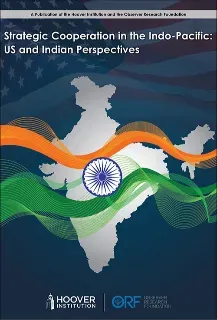Introduction
Paul Kapur and Harsh V. Pant
The United States-India strategic partnership has a natural, seemingly inevitable quality about it. For the cooperative incentives created by the need to ensure a free and open Indo-Pacific region, balance rising Chinese power, and enhance prosperity through trade and other economic cooperation, are very strong. Indeed, it was the power of these incentives that overcame decades of acrimony and mistrust that had characterized the U.S.-India relationship during the Cold War, gave rise to a genuine partnership between the two countries, and then propelled that partnership forward, against the backwards pull of history. Today, the US-India bilateral partnership is also embedded in wider plurilateral frameworks, from the Quadrilateral Security Dialogue in the Pacific to the I2U2 (India, Israel, the United Arab Emirates and the United States) in the Middle East.
Despite these powerful incentives and structures, however, the success of the U.S.-India partnership is not inevitable; the effective formulation and execution of cooperative policies require careful management. Inadequate management leaves each country with unmet expectations of the other, leading to disagreements and acrimony, as in U.S.-India spats over the war in Ukraine; to diplomatic vacuums impeding forward progress; and to unmet economic promise, as in lack of a U.S.-India free trade agreement and battles between the two countries in the World Trade Organization.
Thus, while recognizing that U.S.-India cooperation is to some degree a natural phenomenon, we must develop ideas and approaches to optimize and operationalize it. Otherwise, the relationship may stall, and it may even slide backwards. Given the high stakes in U.S.-India partnership, that is an outcome that we must avoid.
This project addresses five subjects central to U.S. and Indian interests – governance, trade, security, technology and energy – in the two countries’ region of common concern, the Indo-Pacific. Short papers review the history of U.S.-India cooperation in these areas, explain where that cooperation stands now, outline joint challenges and opportunities, and make concrete suggestions for the future. These suggestions can help the U.S. and India to manage their cooperative efforts, and ensure that they give rise to effective policies. They include:
- Emphasizing Indian military capacity building, particularly in the maritime domain, which will be a primary locus of Indo-Pacific competition, which has traditionally not been a focus of Indian strategic attention, and where relatively modest improvements can have outsized effects.
- Working together to develop multilateral governance structures and connect like-minded countries in the Indo-Pacific region, with India acting as a regional leader.
- Giving natural gas a more central, and longer-lived, role in the energy transformations of both India and the United States than either country currntly envisions.
- Prioritizing bilateral economic engagement, ultimately reaching a trade agreement that reduces trade barriers and improves business environments in both countries.
- Putting the “Major” in the U.S.-India Major Defense Partnership by sharing with India advanced defense technologies at the level of U.S. treaty allies.
We undertake this effort at a particularly urgent moment. The China challenge is growing rapidly, in the face of significant Chinese military improvements and increasingly authoritarian behavior. And U.S.-India relations suffer from disagreements over India’s relationship with Russia and the war in Ukraine, and improving ties between the United States and Pakistan.
The Hoover Institution and the Observer Research Foundation are ideal partners in a project such as this. Although they have not worked together before, both organizations recognize the importance of good ideas to sound public policy and are committed to close U.S.-India cooperation to advance common interests. We hope that this inaugural effort will influence public debate and discussion, help give rise to more effective U.S.-India cooperation, and pave the way for further Hoover-ORF collaboration in the future.
Read the report here.
The views expressed above belong to the author(s). ORF research and analyses now available on Telegram! Click here to access our curated content — blogs, longforms and interviews.

 PDF Download
PDF Download



 PREV
PREV



